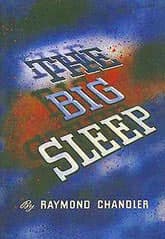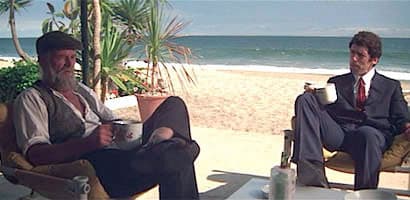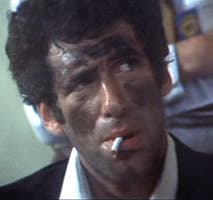The Big Sleep
Critique • Quotes • Philip Marlowe at the movies
 First edition
First editionFirst publication
1939
Literary form
Novel
Genres
Crime, mystery
Writing language
English
Author's country
United States
Length
Approx. 72,000 words

Old-style detective Marlowe (Eliot Gould, right) confronts 1970s life in film of The Long Goodbye.
Misty Marlowe
The Long Goodbye (1973): Film, 112 minutes; director Robert Altman; writer Leigh Brackett; featuring Eliot Gould, Nina van Pallandt, Sterling Hayden, Mark Rydell
If you think James Garner was laidback as Raymond Chandler's gumshoe in Marlowe, wait'll you see Elliot Gould in The Long Goodbye (1973).
Maverick director Robert Altman had an interesting idea for filming Leigh Brackett's script to revive Chandler, which he called "Rip Van Marlowe": present the character as if he had been sleeping since the early 1950s and had just woken up twenty years later. Marlowe would walk around the early 1970s as if he were from an another era, not really a part of these times.
Cinematographer Vilmos Zsigmond added another creative element: flashing—a process of exposing negative film to wash out the colours, creating a dreamy, almost smoky look. These two innovations, combined with Gould's fumbling screen persona, do indeed create the impression the character is drifting through southern California half asleep.
Whether this is a good thing is debatable. It succeeds in capturing the anomaly of an old-fashioned, do-right private eye in the modern world, but it's no longer the old-fashioned, do-right private eye we've grown to love. Certainly not in the Bogart or Powell tradition.
Altman has argued his Marlowe is actually closer to Chandler's than that of the 1940s screen icons. He's partially correct, in my view. His and the earlier manifestations of Marlowe bring out some aspects of the literary character and freely enhance others.
Altman is also famous for letting his actors improvise and Gould may be the prime exemplar of this approach. It works wonderfully well in some scenes, such as when Marlowe is fingerprinted and proceeds to blacken his face with the ink and break into Al Jolson to irritate his police interrogators.
It also works in a meandering but entertaining scene with veteran actor Sterling Hayden (as writer Roger Wade) for whom the lack of restraint lets him steals every scene he's in, despite the actor reportedly being drunk and stoned throughout.
Elsewhere, however, the dialogue just seems to wander to no purpose while the actors search for appropriate lines. Yes, it's very cinéma verité—like many of the exchanges we have in real life every day—but it's also cinéma ennuyeux at times.
More successfully, the camera is always kept moving, both panning and subtly zooming, sometimes for no dramatic reason and sometimes with brilliant effect, such as when Marlow is speaking to the writer's wife (Nina Van Pallandt) at a beach house window, as it's slowly revealed her husband in the background is wading into the waves to commit suicide. A less relevant moving shot takes place in Mexico when the camera wanders away from Marlow to focus on dogs humping in the background.
Out of character
That suicidal action of Roger Wade is one of several filmic plot points that annoy fans of the novel. The movie takes only the bare outline of the book's story and departs from it in some rather outrageous ways.
Most egregious is the final, shocking move by Marlowe, which is out of character not just for Chandler's hero but for the Gould-portrayed sleuth of the movie.
Trailer for Robert Altman's smoky The Long Goodbye.
Rounding out the cast are all manner of actors who jumped at the chance to work with Altman, including Bobby Rydell as a creepy psychotic gangster and Henry Gibson as a psychiatric doctor, creepy in another way, as well as a brief turn from David Carradine. Also watch for Arnold Schwarzenegger in an early non-speaking appearance.
Apart from the film's concluding misfire (which incidentally has continued to be defended by all concerned), the cinematic Long Goodbye is an interesting movie in its own rights. It doesn't give us Chandler, nor anything like Chandler's world, but rather some artists at the top of their game—behind and before the camera—creating their own vision of the genre's future.
The Long Goodbye was only a modest success at the box office, having confused many viewers, but has since become a minor cult classic.
Chandler traditionalists have other options, as we'll shortly see.
— Eric


